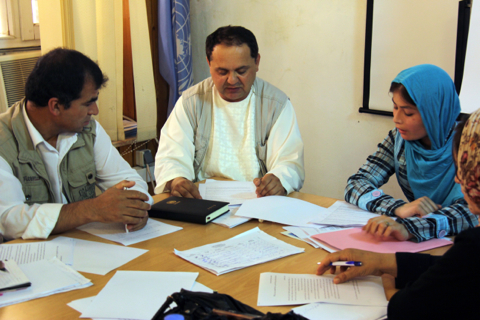PUL-E-KHUMRI - Abdul Sadat, a radio reporter working in the northern Afghan province of Baghlan, has been threatened by various groups three times in the last six years for working as a journalist seeking information.
Mr. Sadat, a journalist with Tapa-e-Qurgha radio and one of a number of reporters who recently participated in a training workshop in the provincial capital, Pul-e-Khumri, organized by the United Nations Assistance Mission in Afghanistan (UNAMA), says he will continue to work despite these threats because he believes in informing the public.
A leading Afghan media watchdog, NAI – Suporting Open Media in Afghanistan, monitors such threats and other forms of intimidation against media workers. It says that in the month of April alone, 30 threats were registered against reporters working in Afghanistan. In the most recent case, in May, a reporter for Radio Nadjhrab, a station in the Kapisa valley in central Afghanistan, was found shot in the head, 18 days after he had gone missing.
The UN takes these threats seriously and plays an active role promoting press freedom and security for journalists. In a statement released on World Press Freedom Day on 3 May, UNAMA called on all political stakeholders in the country to join hands in securing freedom of the press and the right of expression.
According to the UN Education, Scientific and Cultural Organization (UNESCO), over the past ten years, more than 500 journalists have been killed around the world, and the majority of them were not war correspondents. It notes that local journalists are the most vulnerable, and they are not dying in crossfires. Rather, they are being hunted down and murdered, often in direct reprisal for their reporting.
“Most abuses against journalists and media workers remain uninvestigated and unpunished. This issue is also an important one to be addressed. The failure to bring perpetrators of crimes to justice leads to impunity that perpetuates the cycle of violence against journalists, including community media workers and citizen journalists,” UNESCO states on its website. It adds that the curtailment of their journalistic contribution deprives society as a whole since its members lack information to fully realize their potential and results in a wider impact on press freedom, where a climate of intimidation and violence leads to self-censorship.
In light of the worsening global situation for media workers, the world body has developed a single, strategic and harmonized approach – the UN Plan of Action on the Safety of Journalists and the Issue of Impunity – spearheaded by UNESCO, to provide an overarching framework for the UN system to work together on this issue with all the stakeholders, including national authorities and national and international organizations.
The head of NAI, Seddiquallah Tauhidi, said that the problem of safety for Afghan journalists is not a lack of rigorous legal protections, with the country possessing a relatively stronger legal framework than its neighbours, rather, the challenge remains in the implementation of those safeguards. A newly-formed journalists’ federation has been trying to make this point with the Afghan Government.
For some of those attending the training workshop in Pul-i-Khumri, such safeguards are vital, but the failure to implement them does not stop them from reporting.
“When I was threatened, I contacted NAI and they told me that I should broadcast the story,” said Muhammad Zakir Noori, a radio journalist working in Choonghar, in Baghlan. “Afterwards, people were happy when they heard my report.”
The workshop was part of a series of training programmes carried out by UNAMA’s Strategic Communication and Spokespersons Unit (SCSU), covering radio, video and photo-journalism instruction. Over the past year, more than a hundred Afghan reporters, mostly those working outside the capital, Kabul, have taken part in these skills-building workshops.
Related: UNESCO page on journalists killed in the exercise of their profession






